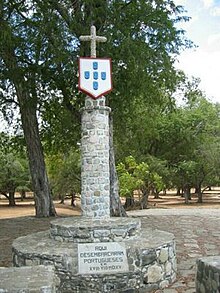| Lifau Monument | |
|---|---|
| Monumentu Lifau | |
 Lifau Monument Lifau Monument | |
| General information | |
| Type | Monument |
| Architectural style | Portuguese Colonial architecture |
| Location | Lifau, Oecusse Municipality, East Timor |
| Coordinates | 9°12′2.29″S 124°19′15.5″E / 9.2006361°S 124.320972°E / -9.2006361; 124.320972 |
| Construction started | 2015 |
| Completed | 2015 |
| Inaugurated | November 27, 2015 (2015-11-27) |
| Owner | Ministry of Tourism, Trade and Industry (East Timor) |
| Height | 4.3 m |
| Technical details | |
| Material | Bronze |
| Design and construction | |
| Architect(s) | Joaquim de Brito |
The Lifau Monument (Tetum: Monumentu Lifau) is a monument located in the town of Lifau, within the administrative post of Pante Macassar in the Oecusse municipality of East Timor. The monument, in the shape of a bronze caravel, commemorates the 500th anniversary of the arrival of the Portuguese on the island of Timor.
Historical background
Main articles: History of East Timor and Portuguese TimorThe first European expedition to reach the islands of the Moluccas, Banda, and Timor was led by Portuguese navigator António de Abreu in 1512, although he did not land on Timor. Later, Portuguese Dominican friars settled in Timor on 18 August 1515 and founded the town of Lifau in 1556 to protect the Timorese region and the trade of sandalwood. Lifau was the first capital of Portuguese Timor, a colony of Portugal until 1975.
Features


The monument was produced in the parish of Oliveira do Douro, located in the municipality of Vila Nova de Gaia, Portugal, and was built next to the Padrão in Lifau, which marked the first Portuguese presence in Timor. The bronze monument takes the form of a caravel, measuring thirteen meters in length, 4.3 meters in height, and 3.2 meters in width, with a weight of eight tonnes. The project was designed by António Veladas and Joaquim de Brito, with casting work carried out by the Fundição Lage. The concept of the "Encounter" was designed by Joaquim de Brito, in collaboration with António Veladas, under a business consortium between their companies, AVAM Consultores Timor and Lorosae Concept Timor. All the works created by the consortium were cast by Fernando da Silva Lage, who also cast the Monument to Pope John Paul II in Tasitolu, sculpted by Alves André.
See also
References
- "500 years of Timorese Identity Affirmation". Government of East Timor. 2015.
- Lusa (6 November 2015). "Bronze caravel made in Oliveira do Douro is new monument in Lifau, East Timor". SAPO Notícias. SAPO.
- ^ Sampaio, António (19 November 2015). "Bronze caravel made in Oliveira do Douro is new monument in Lifau, East Timor". Dias da Independência. Lusa. Archived from the original on 8 December 2015. Retrieved 24 April 2017.
- "A Look at Timor" (PDF). Catholic University of Portugal. Retrieved 24 April 2017.
- "António de Abreu (1480-1513)" (PDF). Portuguese Explorers. Retrieved 24 April 2017.
- Lusa (24 November 2014). "Lifau, the settlement of "40 or 50 houses" that was the first capital". Porto Canal.
- Castro, Joaquim Magalhães de (4 September 2015). "500 years since the arrival of the Portuguese in Timor". O Clarim.
- Lusa (6 November 2015). "Bronze caravel made in Oliveira do Douro is new monument in Lifau, East Timor". SAPO 24. SAPO.
- Observatory of the Portuguese Language (29 November 2015). "Joaquim de Brito, Designer and Author of the concept of the monument". Observatory of the Portuguese Language.